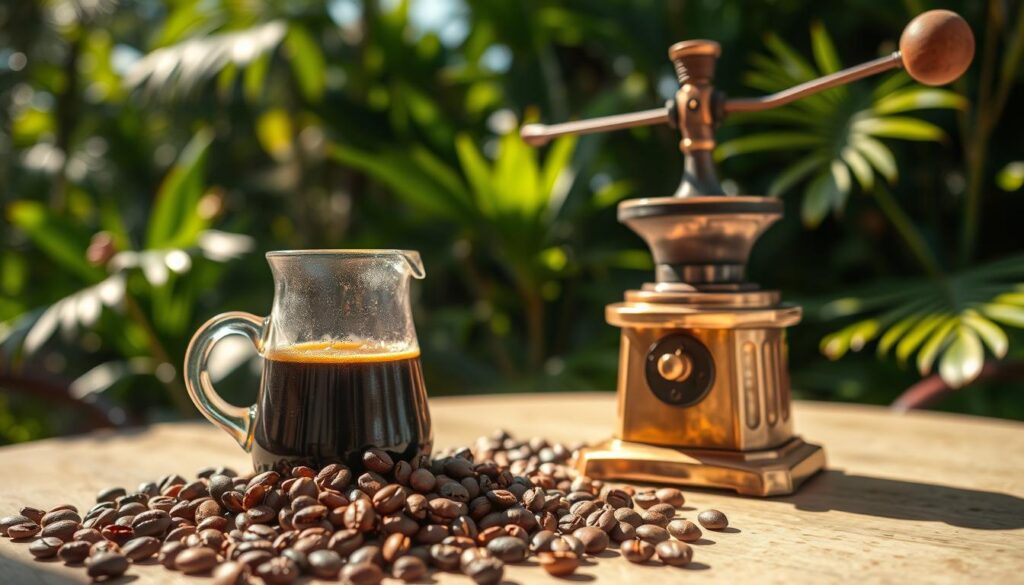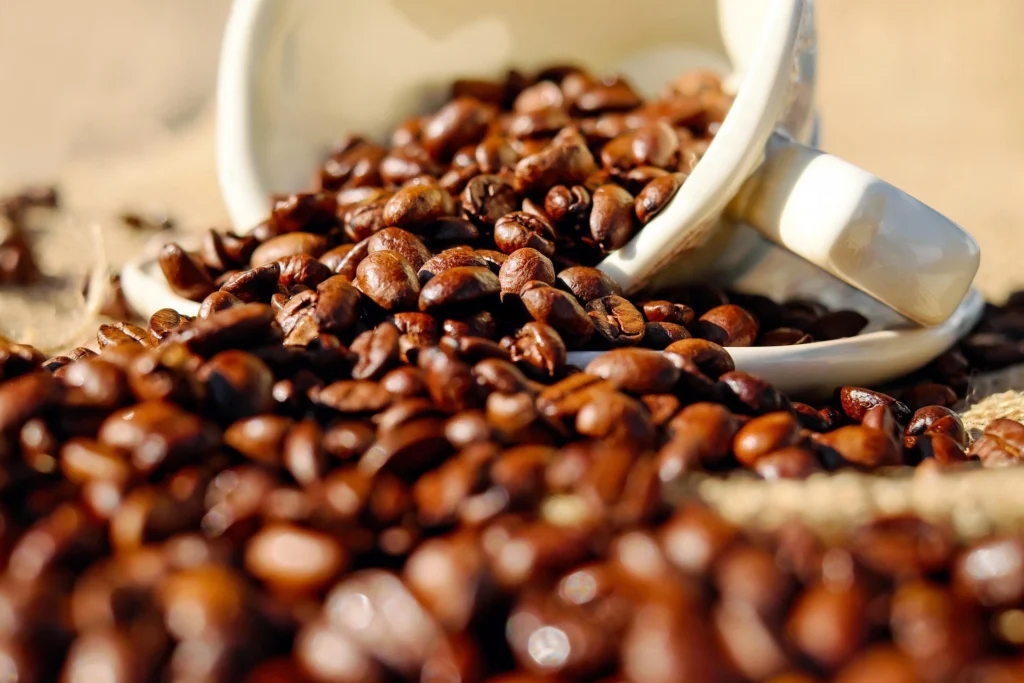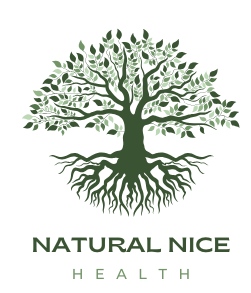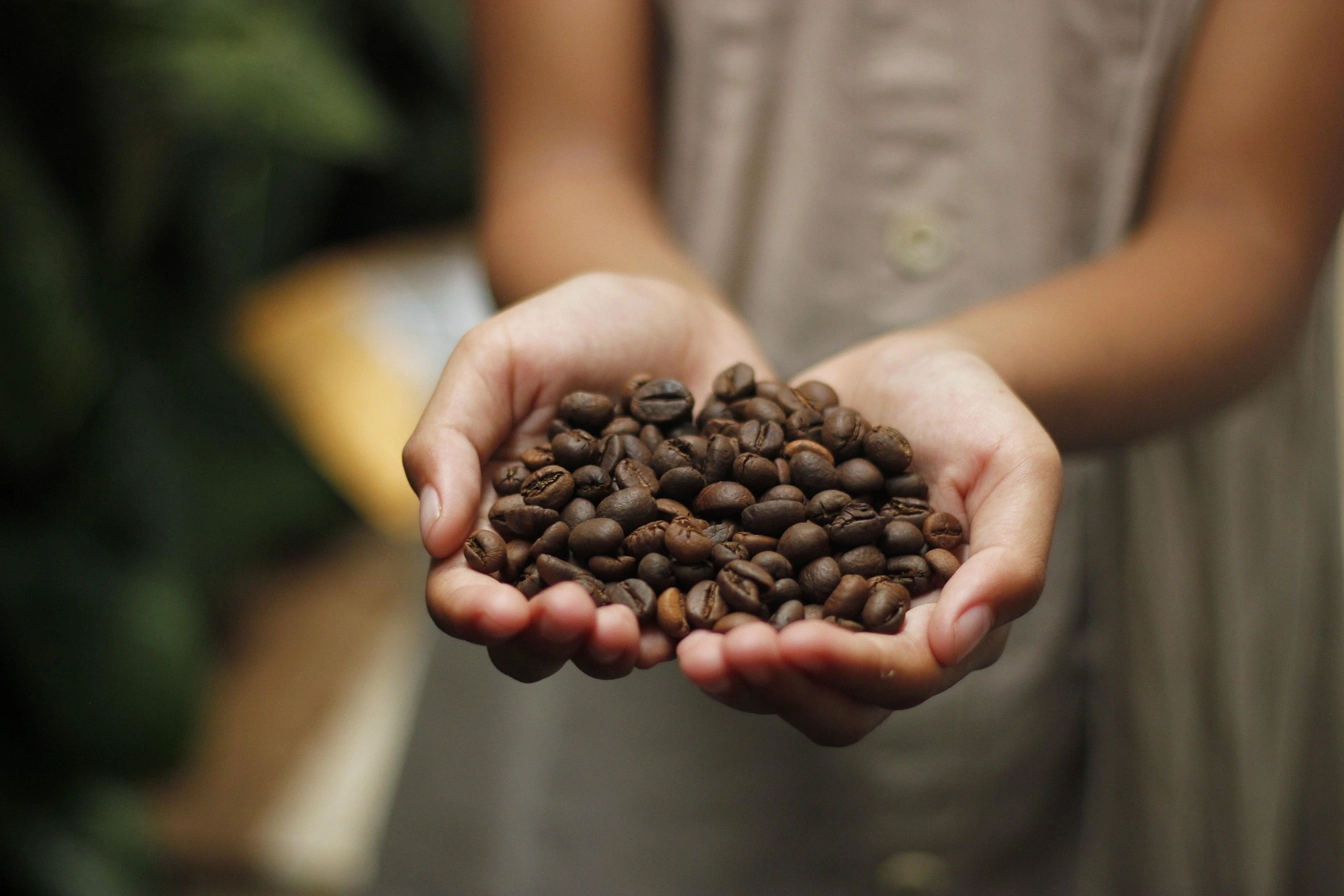The Health Benefits of Drinking Natural and Organic Coffee
Every morning, I started my coffee ritual with a simple question. Why not choose the best for my body? Switching to natural and organic coffee made me feel energized without guilt. No more worries about pesticides or chemicals.
Every sip now feels like a promise to myself and the planet. Natural and organic coffee isn’t just a trend. It’s a path to better health.
By avoiding synthetic pesticides, these beans keep toxins out of my system. This lets the coffee’s natural antioxidants shine. My journey showed me that choosing organic benefits me, the farmers, and the earth.
Imagine starting your day with a drink as pure as it is powerful. That’s what natural and organic coffee offers. It’s not just about flavor. It’s a daily step toward wellness and responsibility.
Roast Your Own Natural and Organic Coffee at Home
If you’re passionate about natural and organic coffee, investing in your own Electric Home Coffee Roaster is a game-changer. This 500g capacity roasting machine is perfect for home use, featuring a built-in smoke filter and chaff collector for a clean, aromatic roasting experience.
With full control over roast time and temperature, you can bring out the rich, complex flavors hidden inside every organic coffee bean. Whether you’re a barista or just starting your journey into home roasting, this machine lets you create fresh, toxin-free coffee the natural way—without additives or chemicals.
Make your morning cup truly authentic. Roast, grind, and brew your beans the way nature intended.
👉 Buy this electric roaster now and taste the difference in every sip of your organic coffee.
Table of Contents
Understanding Natural and Organic Coffee

Let’s start with the basics. When I first learned about natural and organic coffee, I realized many people mix up these terms. This section breaks down what defines each category, so you can shop with clarity.
☕ Maximize the Benefits of Natural Coffee with the Right Brew!
To truly enjoy the rich taste and health benefits of natural and organic coffee, your brewing method matters.
The AeroPress Original Coffee Maker delivers a smooth, full-bodied coffee without bitterness or grit — perfect for preserving all the antioxidants and natural flavors you love.
Lightweight, portable, and easy to use, it’s ideal for a healthy coffee ritual at home or on the go!
👉 Discover the AeroPress here and transform your coffee experience naturally.
What Makes Coffee Natural?
Natural coffee often refers to beans processed without artificial additives. Think of it like this: natural means no synthetic flavors or preservatives. But, this label doesn’t guarantee farming methods. Here’s what to know:
- No artificial additives in the final product
- Focus on minimal processing
- No official certification required
Why Organic Coffee Beans Matter
Now let’s talk organic coffee beans. Unlike “natural,” organic has strict rules. Here’s how they’re different:
| Standard Coffee | Organic Coffee Beans |
|---|---|
| Uses synthetic pesticides | Grown without synthetic chemicals |
| No third-party certification | USDA-certified to meet eco-friendly standards |
| Higher environmental impact | Protects soil and biodiversity |
When I choose organic coffee beans, I’m supporting farms that avoid harmful chemicals. Certifications like USDA Organic or Rainforest Alliance ensure transparency. These beans also often taste richer since nutrients in the soil stay balanced.
My Journey to Organic Coffee Excellence
My journey to organic coffee started with a simple question. How does my morning coffee affect the world? I found out that every cup connects to farmers around the world. That’s when I learned about fair trade coffee.
Meeting growers in Guatemala, I saw the impact of fair trade. It ensures farmers get fair wages and safe work. This choice is about quality and ethics.

| Aspect | Conventional Coffee | Fair Trade Coffee |
|---|---|---|
| Chemical Use | Heavy pesticides | Organic methods |
| Farmer Earnings | Low wages | Guaranteed fair prices |
| Environmental Impact | Deforestation, pollution | Sustainable farming practices |
Choosing fair trade coffee changed my view. Here’s what I learned:
- Every purchase supports real people and places.
- Organic methods protect ecosystems.
- Fair trade practices mean better lives for farmers.
Now, I look for brands that source ethically. By choosing fair trade coffee, I join a movement. It values integrity over convenience. Every bean tells a story of dignity for farmers, the planet, and my health.
How I Brew the Perfect Cup of Organic Coffee
Every sip of organic coffee is a deliberate choice. It’s about picking the right beans and perfecting the brewing technique. This way, every cup showcases nature’s best without any shortcuts.
Selecting Quality Organic Coffee Beans
I start by looking for specialty coffee beans that are certified organic. Brands like Equal Exchange and Counter Culture Coffee are my go-to. They grow their beans without using synthetic chemicals.
I check the roast date to make sure it’s within two weeks. Freshness is crucial. To keep the beans fresh, I store them in airtight containers at room temperature. This helps preserve the oils and aroma.
Brewing Techniques I Trust
My brewing method has three key steps:
- Grind precision: I adjust the grind size based on the brewing method. A burr grinder is essential for consistent grinds, whether for espresso or French press.
- Water quality: I use filtered water to avoid any off-flavors. The ratio of coffee to water is 1:17 (for example, 20g beans to 340g water).
- Timing matters: Pour-over brewing takes 2-3 minutes, while French press steeping takes 4 minutes. Too long can make the coffee bitter.
For specialty coffee, I prefer pour-over to bring out the unique flavors of the beans. Always preheat the brewing vessel to avoid shocking the coffee. Small tweaks can make a big difference in taste.
Tips for Sourcing Ethically Sourced and Fair Trade Coffee
Choosing ethically sourced coffee is easy. Just look for Fair Trade or Rainforest Alliance labels on the packaging. These labels mean farmers get fair pay and work in safe places. I always choose brands that tell open stories about their supply chains.
Find roasters that work directly with growers. Companies like Equal Exchange and Café Direct cut out middlemen. Their websites show how they support farmers and the environment. Don’t forget to ask questions. Coffee shops and stores should tell you where their beans come from and how they help communities.
- Check certifications like Fair Trade or USDA Organic.
- Choose brands sharing grower stories and fair labor practices.
- Support roasters using direct trade models for better farmer payouts.
Spending a little more on ethically sourced coffee makes a big difference. Every purchase helps farmers earn better wages and farm in eco-friendly ways. Start by switching one brand at a time. Soon, your choices will have a big impact on farmers and the planet.

Exploring Specialty and Single-Origin Brews
When I first tried specialty and single-origin coffee, I was amazed. These coffees offer tastes unlike any mass-produced blends. They celebrate unique stories and flavors.
Defining Specialty Coffee
Specialty coffee is all about quality. Beans must score 85+ points to qualify. This means they have no major defects and show off flavors like chocolate or citrus.
Every sip is a result of careful farming and processing. It’s a taste of perfection.
The Benefits of Single-Origin Coffee
Single-origin coffee has its own story. Here’s why it’s special:
- Regional uniqueness: A Ethiopian Yirgacheffe has floral notes, while a Colombian brew has nutty undertones.
- Direct connections: Knowing beans come from a specific farm builds transparency. I’ve visited farms in Costa Rica where beans thrive at high altitudes, shaping their taste.
- Flavor depth: Unlike blends mixing beans from multiple regions, single-origin highlights a single farm’s craftsmanship.
Choosing single-origin coffee is more than just taste. It’s a journey to understand how geography shapes every cup. That’s why I always check origin labels when I shop.
Sustainable and Eco-Friendly Coffee Practices
Choosing sustainable coffee supports our planet. I focus on farming that keeps ecosystems safe and healthy. Organic farming avoids harmful pesticides, making our landscapes cleaner.
- Protecting forests by avoiding deforestation for plantations.
- Using compost and natural mulch to enrich soil without synthetic chemicals.
- Planting shade trees to support local wildlife and reduce carbon footprints.
Certifications like USDA Organic and Rainforest Alliance show these efforts are real. They make sure farmers care for the environment as much as they produce. By picking these options, I help make the air cleaner, the soil healthier, and ecosystems thrive.
Every time we buy sustainable coffee, we choose a greener future. We can change the industry, one cup at a time. Let’s think about the planet with every sip.
Delighting in Shade-Grown and Premium Coffee Experiences
Enjoying a cup of shade-grown coffee is truly special. It’s not just a trend; it’s a dedication to taste and the environment. Each sip shares a tale of slow growth under the sun’s gentle touch, where trees and beans live together. Here’s why shade-grown coffee is unique.
The Perks of Shade-Grown Coffee
- Richer Flavors: The slower maturation under shade deepens complexity, with hints of chocolate or citrus.
- Environmental Care:
Protects forests and wildlife by maintaining diverse ecosystems.
Enjoying a Premium Coffee Experience
My mornings start with shade-grown beans, roasted to perfection. The aroma feels like a warm hug from the tropics. Here’s a comparison of its benefits:
| Aspect | Shade-Grown Coffee | Sun-Grown Coffee |
|---|---|---|
| Flavor | Layered, nuanced | Blunt, one-note |
| Sustainability | Protects forests | Encourages deforestation |
| Biodiversity | Home to birds and insects | Monoculture farms |
Nature’s slower pace makes a drink that’s both a pleasure and a nod to sustainable farming. Every bag I pick supports forests and my taste buds.
Inclusive Guide to Fair Trade and Sustainable Coffee
Choosing premium coffee is more than just taste. It’s about making ethical choices. I’ve learned that certifications and farming practices are key to quality and integrity.
Understanding Fair Trade Certification
Fair Trade certification means farmers get fair pay and safe work. Here’s what’s important:
- Certified farms pay workers a living wage
- They ban exploitative labor
- They invest in community development
Look for the Fair Trade seal to support producers of premium coffee under ethical standards.
Supporting Sustainable Farming
| Certification | Key Practices | Impact on Premium Coffee |
|---|---|---|
| Fair Trade | Environmental safeguards | Preserves flavor consistency |
| Rainforest Alliance | Biodiversity protection | Enhances bean quality |
| USDA Organic | No synthetic chemicals | Ensures purity in premium coffee |
Buying certified beans supports sustainable farming. This keeps soils fertile for future harvests. My advice? Always check labels for certification logos. They guide you to quality and ethics.
Conclusion
Every cup of natural and organic coffee is more than a morning ritual. It’s a choice that impacts health and the planet. My journey into organic coffee has shown how brewing with ethically sourced beans supports sustainable practices.
Opting for eco-friendly coffee ensures farmers receive fair pay. It also protects ecosystems. Choosing shade-grown beans or fair trade options adds up to meaningful change.
By choosing eco-friendly coffee, we vote for cleaner soil and thriving biodiversity. We also support equitable livelihoods for growers. Let’s make every sip count, fostering a healthier world one cup at a time.

